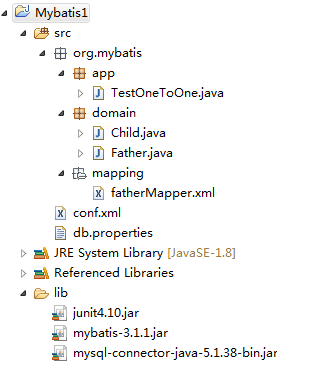【Mybatis】一对一实例
①创建数据库和表,数据库为mytest,表为father和child
DROP TABLE IF EXISTS child;
DROP TABLE IF EXISTS father; CREATE TABLE child(
child_id INT PRIMARY KEY auto_increment NOT NULL,
child_name VARCHAR(20)
); CREATE TABLE father(
father_id INT PRIMARY KEY auto_increment NOT NULL,
father_name VARCHAR(20),
child_id INT
); ALTER TABLE father ADD CONSTRAINT fk_child_id FOREIGN KEY (child_id) REFERENCES child(child_id); INSERT INTO child(child_name) VALUES ("Guo Xiang");
INSERT INTO child(child_name) VALUES ("Zhang Wuji");
INSERT INTO father(father_name, child_id) VALUES ("Guo Jing", 1);
INSERT INTO father(father_name, child_id) VALUES ("Zhang Cuishan", 2);
father&child
②创建Java工程,导入相应的jar包

③创建配置文件conf.xml和数据库配置文件db.properties
<?xml version="1.0" encoding="UTF-8"?>
<!DOCTYPE configuration PUBLIC "-//mybatis.org//DTD Config 3.0//EN"
"http://mybatis.org/dtd/mybatis-3-config.dtd"> <configuration> <properties resource="db.properties"></properties>
<environments default="development">
<environment id="development">
<transactionManager type="JDBC"></transactionManager>
<dataSource type="POOLED">
<property name="driver" value="${driver}"/>
<property name="url" value="${url}"/>
<property name="username" value="${name}"/>
<property name="password" value="${password}"/>
</dataSource>
</environment>
</environments> <mappers>
<mapper resource="org/mybatis/mapping/fatherMapper.xml"/>
</mappers>
</configuration>
conf.xml
driver = com.mysql.jdbc.Driver
url = jdbc:mysql://localhost:3306/mytest
name = root
password = root
db.properties
④创建实体类Father和Child
package org.mybatis.domain;
public class Child {
private int child_id;
private String child_name;
public int getChild_id() {
return child_id;
}
public void setChild_id(int child_id) {
this.child_id = child_id;
}
public String getChild_name() {
return child_name;
}
public void setChild_name(String child_name) {
this.child_name = child_name;
}
@Override
public String toString() {
return "[Child = child_id:" + child_id + ", child_name:" + child_name + "]";
}
}
Child
package org.mybatis.domain;
public class Father {
private int father_id;
private String father_name;
private Child child;
public int getFather_id() {
return father_id;
}
public void setFather_id(int father_id) {
this.father_id = father_id;
}
public String getFather_name() {
return father_name;
}
public void setFather_name(String father_name) {
this.father_name = father_name;
}
public Child getChild() {
return child;
}
public void setChild(Child child) {
this.child = child;
}
@Override
public String toString() {
return "[Father = father_id:" + father_id + ", father_name:" + father_name
+ ", child:" + child + "]";
}
}
Father
⑤创建sql映射文件fatherMapper.xml
<?xml version="1.0" encoding="UTF-8"?>
<!DOCTYPE mapper PUBLIC "-//mybatis.org//DTD Mapper 3.0//EN"
"http://mybatis.org/dtd/mybatis-3-mapper.dtd"> <mapper namespace="org.mybatis.mapping.fatherMapper"> <!-- 方式一:嵌套结果 -->
<!-- <select id="getChild" parameterType="int" resultMap="ChildMap"> -->
<!-- select * from child c, father f where c.child_id = f.child_id and f.father_id=#{id} -->
<!-- </select> --> <!-- <resultMap type="org.mybatis.domain.Father" id="ChildMap"> -->
<!-- <id property="father_id" column="father_id"/> -->
<!-- <result property="father_name" column="father_name" /> -->
<!-- <association property="child" javaType="org.mybatis.domain.Child"> -->
<!-- <id property="child_id" column="child_id"/> -->
<!-- <result property="child_name" column="child_name"/> -->
<!-- </association> -->
<!-- </resultMap> --> <!-- 方式二:嵌套查询 -->
<select id="getChild" parameterType="int" resultMap="ChildMap">
select * from father where father_id=#{id}
</select> <resultMap type="org.mybatis.domain.Father" id="ChildMap">
<id property="father_id" column="father_id"/>
<result property="father_name" column="father_name" />
<collection property="child" column="child_id" select="getChildCollection">
</collection>
</resultMap> <select id="getChildCollection" resultType="org.mybatis.domain.Child">
select * from child where child_id=#{child_id}
</select> </mapper>
fatherMapper.xml
⑥向配置文件中注册 fatherMapper.xml 文件【已添加,查看第③步】
⑦测试类
package org.mybatis.app; import java.io.InputStream; import org.apache.ibatis.session.SqlSession;
import org.apache.ibatis.session.SqlSessionFactory;
import org.apache.ibatis.session.SqlSessionFactoryBuilder;
import org.junit.Before;
import org.junit.Test;
import org.mybatis.domain.Father; public class TestOneToOne { SqlSession session; @Before
public void beforeLoad() {
InputStream inputStream =
TestOneToOne.class.getClassLoader().getResourceAsStream("conf.xml");
SqlSessionFactory sqlSessionFactory =
new SqlSessionFactoryBuilder().build(inputStream);
session = sqlSessionFactory.openSession();
} @Test
public void testOneToOne() {
// 根据fatherID得到child
String statement = "org.mybatis.mapping.fatherMapper.getChild";
Father father = session.selectOne(statement,2);
session.close();
System.out.println(father.getFather_name() + "'s child is "
+ father.getChild().getChild_name());
}
}
TestOneToOne
⑧结构图

fatherMapper.xml中有两种方式,两种方式的结果一样
【Mybatis】一对一实例的更多相关文章
- mybatis一对一映射配置详解
听说mybatis一对一有三种写法,今天我试了一下. 数据库表准备 为了偷懒,我直接就拿用户权限菜单里的菜单表和菜单与权限的中间表做实现,他们原来是多对多的关系,这边我假设这两张表是一对一. 表 g ...
- mybatis 一对一关联 association 返回空值
mybatis 一对一关联 association 返回空值 最近学习spring mvc + mybatis开发,看的书是<Spring MVC+Mybatis开发 从入门到精通>,在学 ...
- Java基础-SSM之mybatis一对一关联
Java基础-SSM之mybatis一对一关联 作者:尹正杰 版权声明:原创作品,谢绝转载!否则将追究法律责任. 一.准备测试环境(创建数据库表) 1>.创建husbands和wifes表并建 ...
- Java基础-SSM之mybatis一对一外键关联
Java基础-SSM之mybatis一对一外键关联 作者:尹正杰 版权声明:原创作品,谢绝转载!否则将追究法律责任. 一.准备测试环境(创建数据库表) 1>.创建husbandsfk和wife ...
- MyBatis一对一查询
---------------------siwuxie095 MyBatis 一对一查询 以订单和用户为例,即 相对订 ...
- Mybatis一对一映射
一.Mybatis一对一映射 本例讲述使用mybatis开发过程中常见的一对一映射查询案例.只抽取关键代码和mapper文件中的关键sql和配置,详细的工程搭建和Mybatis详细的流程代码可参见&l ...
- spring+mybatis结合实例
1.通过上两篇文章的学习,大致了解了spring和mybatis的架构和使用原理,下面这篇文章就将给出两者结合的一个小实例,通过该实例进一步探索这两个框架的魅力,工程所需要的所有jar包都在链接:ht ...
- mybatis一对一关联关系映射
mybatis一对一关联关系映射 在关联关系中,有一对一,一对多,多对多三种关联关系. 一对一关系:在操作上,任意一方引入对方的主键作为外键. 一对多关系:在"多"的一方添加&qu ...
- mybatis 一对一关联映射实例
在实际项目开发中,经常存在一对一的关系,如一个人对应一张身份证信息,这就是一对一的关系.下面是一个简单的实例: 1.建表过程我就省略了,主要是一张Person表,一张IDCard表,其相关属性见步骤2 ...
随机推荐
- noip第23课资料
- java_io
JAVA IO流(一)参考文章:http://ifeve.com/java-io-network/,并发编程网原创文章,转载请注明: 转载自并发编程网 – ifeve.com本文链接地址: Java ...
- We FALL ASleep At Night, We Do REST Right
We Do Sleep At Night, We Do REST Right 前言 REST 起源 REST 约束 客户端 - 服务端 无状态 缓存 统一接口 分层系统 按需代码 统一接口约束 资源识 ...
- [算法专题] 二分搜索&排序数组
基础知识 二分非递归写法: int binary_search(const int a[], const int size, const int val) { int lower = 0; int u ...
- kaldi的TIMIT实例二
============================================================================ MonoPhone Training & ...
- jdk8新特性(详解)
最近在复习外加看点面试题,jdk8的新特性虽然在项目用用到过一两个,准备系统的了解一下jdk8的常用新特性 一:Lambd表达式 也可称为闭包 引入函数式编程到Java中 为了使现有函 ...
- utf-8 decode
摘自 Lua 5.3 源文件 lutf8lib.c /* ** Decode one UTF-8 sequence, returning NULL if byte sequence is invali ...
- httpd: apr_sockaddr_info_get() failed for bogon
AH00557: httpd: apr_sockaddr_info_get() failed for bogon AH00558: httpd: Could not reliably determin ...
- SQLServer 查看耗时较多的SQL语句(转)
total_worker_time AS [总消耗CPU 时间(ms)],execution_count [运行次数], qs.total_worker_time AS [平均消耗CPU 时间(ms) ...
- Spring Boot - Profile配置
Profile是什么 Profile我也找不出合适的中文来定义,简单来说,Profile就是Spring Boot可以对不同环境或者指令来读取不同的配置文件. Profile使用 假如有开发.测试.生 ...
